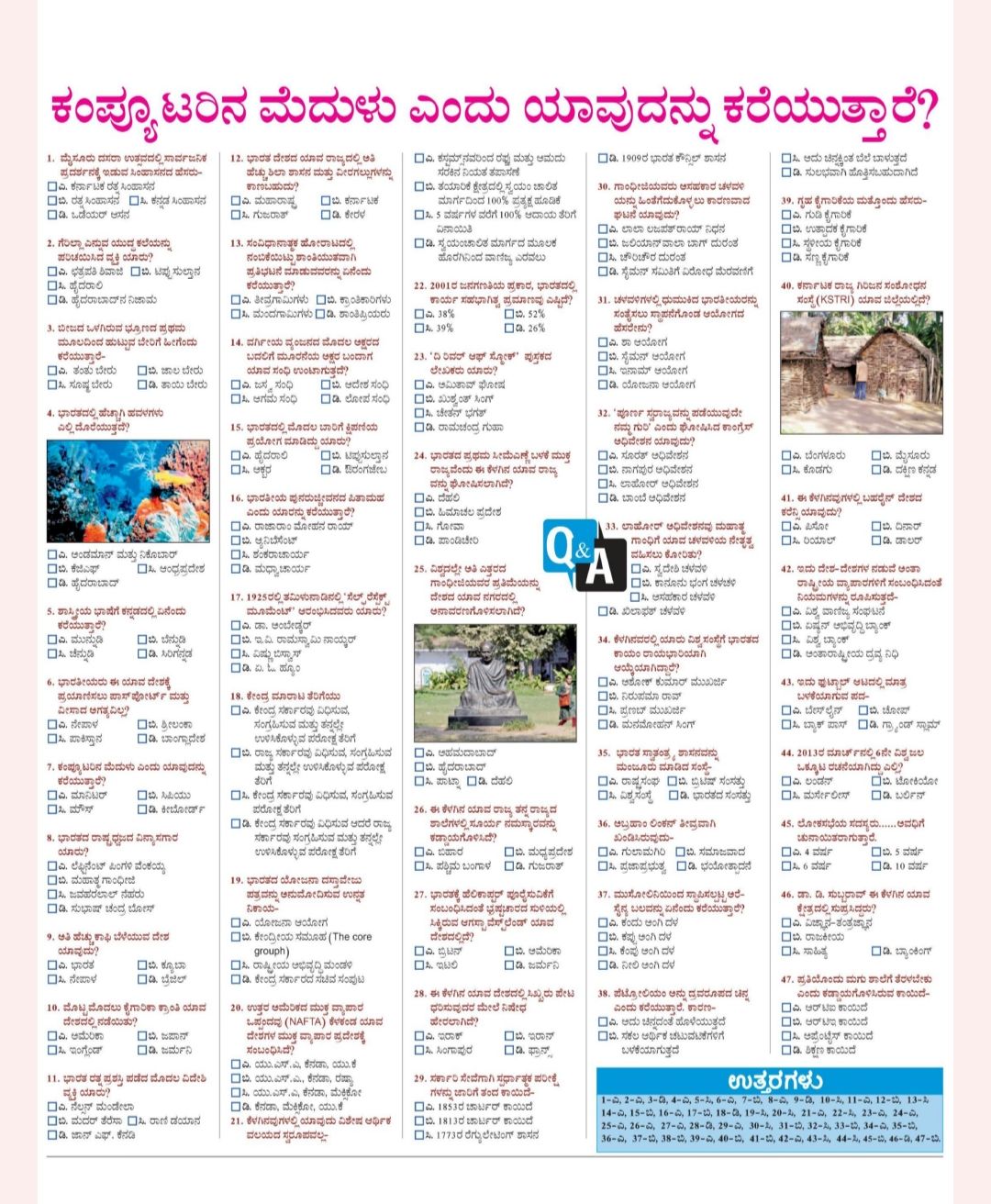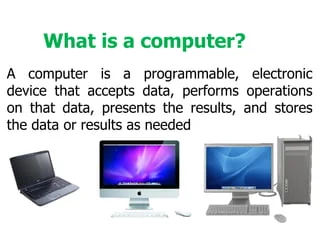A computer is an electronic device that processes data, performs tasks, and executes instructions given by a user or a program. It consists of hardware components (like the central processing unit, memory, storage devices, input/output devices) and software (programs, operating systems) that work together to perform various functions such as calculations, data storage, communication, and more.
| Basic computer knowledge involves understanding fundamental concepts related to computers, software, hardware, and their applications. Here’s a step-by-step guide to help you prepare: |
|
Introduction to Computer Science: Definition and scope of computer science Historical overview of computers and computing Basic components of a computer system (hardware and software) Programming Fundamentals: Introduction to programming languages Basic programming constructs (variables, data types, control structures) Functions and procedures Object-oriented programming concepts
|
- Understand Computer Basics:
Familiarize yourself with basic computer components: CPU, RAM, storage devices, input/output devices (keyboard, mouse, and monitor).
Learn the difference between hardware and software.
- Operating System:
Understand the functions of an operating system (e.g., Windows, macOS, Linux).
Learn basic operations like file management, using the command prompt, and installing/uninstalling software.
- Word Processing:
Learn to use word processing software (e.g., Microsoft Word, Google Docs).
Understand basic formatting, editing, and document organization.
- Spreadsheets:
Familiarize yourself with spreadsheet software (e.g., Microsoft Excel, Google Sheets).
Learn basic functions, formulas, and data manipulation.
- Internet Basics:
Understand how the internet works, including concepts like browsers, URLs, and hyperlinks.
Learn about search engines and how to conduct efficient online searches.
- Email Usage:
Learn to use email effectively, including composing and sending emails, attaching files, and managing your inbox.
- Basic Security Awareness:
Understand the importance of computer security.
Learn about antivirus software, firewalls, and best practices for keeping your computer and data secure.
- File Management:
Learn how to organize and manage files and folders on your computer.
Understand concepts like copying, moving, and renaming files.
- Basic Troubleshooting:
Develop basic troubleshooting skills for common computer issues.
Learn how to perform simple software and hardware troubleshooting.
- Hardware Awareness:
Understand the basic functions of computer hardware components (CPU, RAM, hard drive, etc.).
Learn how to connect and disconnect peripherals.
- Software Installation:
Learn how to install and uninstall software applications on your computer.
- Basic IT Terminology:
Familiarize yourself with common IT terms and acronyms.
🍀FILE TYPE: PDF
🌿FILE PAGES-
🌏FILE Download Option: yes
🏔️File size-9MB
🎈File cost: free
🍀 FILE EDITED -NO
🍀Special thanks to
🌐Download option -yes
💫Edited file: no
🖇️File link. Yes
📝Published year –
🎓 All Compitative examination
👉File Language: English
📝Course code-NO
👉Subject – COMPUTER questions paper
TEACHERS FOR COMPUTER TRINES
📝Download full PDF 📚 free
Computers are used in various fields and for numerous purposes, including:
1. **Communication:** Facilitating email, messaging, video calls, and social media.
2. **Education:** Supporting online learning, research, and educational software.
3. **Business:** Managing finances, creating documents, handling databases, and conducting online transactions.
4. **Entertainment:** Playing games, streaming movies, music, and creating digital content.
5. **Healthcare:** Storing patient records, aiding diagnostics, and simulating medical procedures.
6. **Science and Research:** Conducting simulations, data analysis, and complex calculations.
7. **Design and Creativity:** Graphic design, video editing, animation, and 3D modeling.
8. **Engineering:** Designing structures, running simulations, and creating prototypes.
9. **E-commerce:** Facilitating online shopping, payment processing, and inventory management.
10. **Security:** Implementing cybersecurity measures, encryption, and surveillance systems.
These are just a few examples; computers have become integral in nearly all aspects of modern life due to their versatility and capabilities.
KANNADA MEDIUM
USES OF COLLEGE STUDENTS AND PREPARE THE COMPETITIVE EXAM STUDENTS
DOWNLOAD THE FULL NOTES
Download q4
🤝Share your friends and support me
JOIN OUR TELIGRAM GROUP
🙏🏻🙏🏻🙏🏻🙏🏻🙏🏻🙏🏻🙏🏻🙏🏻



